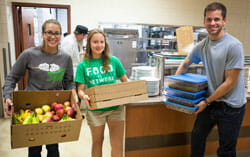Food Recovery Network


Food Recovery Network.
Points of Light gives thanks – today and every day – for the exceptional work of volunteers creating change. Meet today’s Daily Point of Light Award honoree organization, Food Recovery Network, and learn how they brought several groups together around the table to fight hunger.
University of Maryland classmates Mia Zavalij and Ben Simon saw a systemic challenge at their university dining hall with vast amounts of prepared food going to waste. So they conceived an elegantly simple idea: triangulate the efforts of students, on-campus dining facilities and off-campus local hunger-fighting nonprofits to redistribute surplus food.
Food Recovery Network began in 2011, with Mia, Ben and students from three other universities leading food recovery programs who decided to get serious about expanding their efforts to other campuses. The organization works with college students to help them approach campus dining and identify non-profit beneficiaries nearby, train them in food safety and offer support to grow chapters all over the US.
“What connects us all is that it just didn’t make sense to us that we live in a country that wastes almost 40% of the food it produces while 1 in 6 individuals doesn’t know where his or her next meal is coming from,” Mia explains, citing national statistics on food insecurity. “Growing food takes a tremendous amount of energy, labor, and time so we shouldn’t be wasting it, especially when there are people who need it.”
The premise for Food Recovery Network is different than a food bank dealing in non-perishables in that Food Recovery Network’s efforts happen in real-time, with prepared food that is eaten soon after it’s made. Student volunteers trained in food safety take the surplus food from their dining halls, pack it into containers and transport it to nearby charities such as homeless shelters and soup kitchens. Having access to this resource frees up time for the off-campus caretakers and offers different meal options from what many hunger-fighting partners can afford to serve. And busy students can take part from start to finish in a recovery effort typically in about an hour’s time.
In the past 12 months alone, the cause has added more than 70 chapters, using the same formula to bring on-campus dining services and off-campus hunger-fighting nonprofits together through student volunteer work. Overall, the effort has attracted more than 1,000 student volunteers at 105 campus chapters in 30 states plus District of Columbia.
Student volunteers build skills by participating in the effort, cultivating with representatives from university dining services and partner agencies. Some become founders and presidents of their campus chapter, honing their organizational and communication skills. They learn the importance of collaborating with others to make a difference.
Having collected and redistributed more than half a million pounds of prepared food to date, Food Recovery Network is working to change the norm on college campuses from food waste to food recovery.
“In the long run, we envision zero food waste on college campuses across the country and that we have changed the conversation around food waste,” says Mia. “Food is for people, not for trash cans.”
Tell us about the dynamic people in your community doing good deeds and finding solutions to everyday problems through volunteer service. Submit a nomination for the Daily Point of Light Award at http://www.pointsoflight.org/programs/recognition/dpol/nomination
